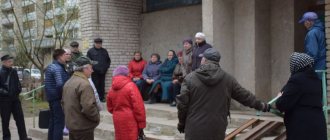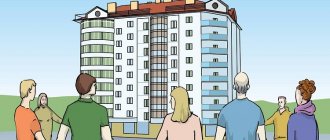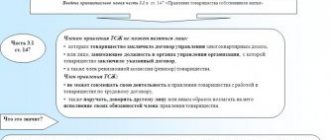Article 135 of the RF Housing Code. Homeowners Association
- A homeowners' association is a non-profit organization, an association of owners of premises in an apartment building for joint management of common property in an apartment building or, in the cases specified in Part 2 of Article 136 of this Code, the property of owners of premises in several apartment buildings or the property of owners of several residential buildings, securing ownership , use and, within the limits established by law, disposal of common property in an apartment building or joint use of property owned by the owners of premises in several apartment buildings, or property owned by the owners of several residential buildings, carrying out activities to create, maintain, preserve and increase such property, provision of utility services to persons using premises in these apartment buildings or these residential buildings in accordance with this Code, as well as for carrying out other activities aimed at achieving the goals of managing apartment buildings or sharing property belonging to the owners of premises in several apartment buildings, or property of owners of several residential buildings.
- The charter of the homeowners' association is adopted at a general meeting, which is held in the manner established by Articles 45 - 48 of this Code, by a majority vote of the total number of votes of the owners of premises in an apartment building.
2.1. The charter of the homeowners' association may provide for the use of a system or other information system when resolving issues related to the management of the homeowners' association, taking into account the functions of these systems.
- The number of members of the homeowners' association who created the partnership must exceed fifty percent of the votes of the total number of votes of the owners of premises in an apartment building.
- A homeowners' association is created without a limitation on the period of activity, unless otherwise provided by the charter of the association.
- A homeowners' association is a legal entity from the moment of its state registration. The homeowners association has a seal with its name, a current and other bank account, and other details.
- The homeowners association is liable for its obligations with all the property it owns. The homeowners association is not liable for the obligations of the association members. Members of a homeowners association are not liable for the obligations of the association.
TSN: what are the main pros and cons of the partnership
If you are considering whether to join TSN, then first of all you need to think about the disadvantages and risks of partnership. The immediate disadvantages of membership in TSN include:
- TSN, like any legal entity, even though it is a non-profit organization, can declare itself bankrupt. This means that property owners, members of TSN, do not have any guarantees for the return of invested funds.
- TSN, of course, acts in the interests of its comrades, but this does not mean that the opinion of each comrade will always be taken into account, so there is a risk of not ensuring the interests of any of the comrades. For example, if a person considers it inappropriate to rent out premises, but the highest management body still decides to conclude a lease agreement in relation to the object.
This is probably where the disadvantages of membership in TSN end; there are clearly more advantages of such an association for property owners. But the risk is always worth considering. The advantages of TSN are as follows:
- in the possibility of decision-making by all members of the partnership;
- in the legislative regulation of the activities of TSN;
- property owners have a real opportunity to manage property through an elected body;
- the opinions of all members of the partnership are taken into account;
- transparency in management (constituent documents and reporting are available to every member of TSN);
- at the meeting, the terms and amount of contributions, the terms and procedure for property management, and the types of contracts to be concluded on behalf of TSN are approved.
Article 136 of the RF Housing Code. Creation and state registration of a homeowners' association
- Owners of premises in one apartment building can create only one homeowners' association. The decision to create a homeowners' association is made by the owners of premises in an apartment building at their general meeting. Such a decision is considered adopted if it is voted for by the owners of premises in the corresponding apartment building, having more than fifty percent of the votes of the total number of votes of the owners of premises in such a building. 1.1. The minutes of the general meeting of owners of premises in an apartment building, at which decisions were made on the creation of a homeowners' association and the approval of its charter, are signed by all owners of premises in an apartment building who voted for the adoption of such decisions.
- A homeowners' association can be created 1) by owners of premises in several apartment buildings, if these houses are located on land plots that, in accordance with the documents contained in the state real estate cadastre, have a common border and within which there are engineering support networks and other infrastructure elements , which are intended for joint use by the owners of premises in these houses. Decisions on the creation of a partnership, on approval of its charter, election of the board of the partnership, on vesting a citizen (including the owner of premises in one of these houses) with the authority of the applicant to apply to the authorities carrying out state registration of legal entities, and in cases provided for by the charter of the partnership, Also, the election of the chairman of the board of the partnership is adopted at general meetings of the owners of premises in each apartment building by a majority of at least two-thirds of the votes of the total number of votes of the owners of premises in the given building. The specifics of the adoption and execution of these decisions are established by the federal executive body that carries out the functions of developing state policy and legal regulation in the field of construction, architecture, urban planning (with the exception of state technical accounting and technical inventory of capital construction projects) and housing and communal services; 2) owners of several nearby residential buildings, country houses with or without personal plots, garages and other objects, if these houses are located on land plots that have a common border and within which there are utility networks and other infrastructure elements, which are designed to serve more than one residential building. Decisions on the creation of a partnership and the approval of its charter are made by agreement of all owners of these houses. Decisions on the election of the board of the partnership, on granting a citizen (including one of the owners of residential buildings) the authority of the applicant to apply to the bodies carrying out state registration of legal entities, and in cases provided for by the charter of the partnership, also on the election of the chairman of the board of the partnership are made at a general meeting owners of residential buildings by a majority of at least two-thirds of the total number of votes of owners of residential buildings.
- State registration of a homeowners' association is carried out in accordance with the legislation on state registration of legal entities.
- A homeowners' association created in accordance with paragraph 2 of part 2 of this article is subject to the requirements established in relation to a homeowners' association created in an apartment building or several apartment buildings, unless otherwise follows from the peculiarities of relations in a partnership created by the owners of several residential buildings .
- When state registration of a homeowners' association, the minutes of the general meeting of owners of premises in an apartment building are submitted, at which decisions were made on the creation of the partnership and on the approval of its charter, and the charter of the partnership, as well as information about the persons who voted at the general meeting of owners of premises in an apartment building for the creation homeowners' associations, about the shares belonging to these persons in the right of common ownership of common property in an apartment building.
Article 137 of the RF Housing Code. Homeowners' Association Rights
- A homeowners' association has the right to: 1) conclude, in accordance with the law, an agreement for the management of an apartment building and other agreements ensuring the management of an apartment building, including the maintenance and repair of common property in an apartment building; 2) determine the estimate of income and expenses for the year, including the necessary expenses for the maintenance and repair of common property in an apartment building, the costs of major repairs and reconstruction of an apartment building, special contributions and deductions to the reserve fund, as well as expenses for others established by this chapter and the articles of association of the purpose partnership; 3) establish, on the basis of the accepted estimate of income and expenses for the year of the partnership, the amounts of payments and contributions for each owner of premises in an apartment building in accordance with his share in the right of common ownership of common property in the apartment building; 4) perform work for the owners of premises in an apartment building and provide them with services; 5) use loans provided by banks in the manner and under the conditions provided for by law; 6) transfer material and monetary resources under an agreement to persons performing work for the partnership and providing services to the partnership; 7) sell and transfer for temporary use, exchange property belonging to the partnership.
- In cases where this does not violate the rights and legitimate interests of the owners of premises in an apartment building, the homeowners association has the right to: 1) provide for use or limited use part of the common property in an apartment building; 2) in accordance with the requirements of the law, in the prescribed manner, build on, rebuild part of the common property in an apartment building; 3) receive for use or receive or acquire land plots into common shared ownership of the owners of premises in an apartment building for housing construction, construction of utility and other buildings and their further operation; 4) carry out, in accordance with the requirements of the law, on behalf and at the expense of the owners of premises in an apartment building, the development of allocated land plots adjacent to such a house; 5) enter into transactions and perform other actions consistent with the goals and objectives of the partnership.
- If the owners of premises in an apartment building fail to fulfill their obligations to participate in common expenses, the homeowners’ association has the right in court to demand forced reimbursement of mandatory payments and contributions.
- A homeowners' association may demand in court full compensation for losses caused to it as a result of the failure of the owners of premises in an apartment building to fulfill their obligations to pay mandatory payments and contributions and pay other general expenses.
HOA governing bodies
Outsiders cannot take part in the management of the apartment building. Therefore, only the owners can control activities aimed at its maintenance.
The homeowners' association must operate under management, the forms of which are established by several regulations. Outsiders cannot take part in the management of an apartment building. Therefore, direct control over activities aimed at maintaining the building can only be exercised by the owners.
Determination of the management bodies of the partnership
By law, a homeowners' association is a legal entity, which means it is obliged to carry out its activities with the help of governing bodies. As in most organizations, members of such governing bodies are members of the HOA. In this case, the appointment procedure is regulated by the constituent documents of the partnership.
The governing bodies of the homeowners' association are the board and the general meeting.
They are necessary in order to resolve all the most important issues that may arise in the partnership. Based on this, there is a certain division of powers between these bodies.
The highest body is considered to be the meeting of all participants of the HOA, while the board headed by the chairman is the executive body. In this case, the chairman also performs a representative function.
Board of the Partnership
The selection of board members is carried out by voting. Each of them has the right to hold his position for two years, no more. The number of board members is established by the HOA charter. Once all board members have been elected, they independently select a representative.
The Board is primarily intended to monitor the timely payment of various payments and contributions.
In addition, his responsibilities include managing an apartment building. The board must hire workers for repairs and other maintenance of the building and surrounding area, enter into an agreement to provide a variety of services to residents, and convene and hold meetings.
The responsibilities of the HOA board also include the need to resolve those issues that, according to the charter, are not within the competence of the audit commission and the general meeting. These questions most often include:
- management of HOA activities;
- drawing up estimates and reports that relate to the financial activities of the partnership;
- disposal of all assets of the HOA in the prescribed manner;
- choosing the necessary method to protect the property of the HOA;
- direct maintenance of the register of members of the organization;
- preparation of draft amendments to the constituent charter, etc.
Persons admitted to the board of an HOA to manage an apartment building are prohibited from:
- combine work in the HOA under an employment contract and in another position;
- combine the position of a board member with other positions in the management bodies of the HOA;
- combine his activities with the activities of the auditor of the partnership.
General meeting of HOA members
Direct management of the partnership is carried out by the general meeting. This collegial governing body of the HOA has a fairly broad scope of activity. After all, managing an apartment building involves solving a large number of issues that concern all residents. Only the owner of the premises can be a member of this management body.
The law requires that all HOA members receive notice of the upcoming meeting on time. As for the method of transmitting the notice, this choice can be made by the members of the HOA board. All this is necessary for the full management of an apartment building.
If a partner in a partnership does not receive this information, one can safely claim that his rights have been infringed. The notice must contain the agenda, which cannot be changed during the meeting.
At the same time, there are different forms of holding a meeting - in person and in absentia. The choice of how to conduct a meeting depends on the agenda and other reasons. The general meeting is considered valid if more than half of the homeowners are present. This condition can be tightened using the organization’s charter. To determine eligibility, participants present are registered before the meeting opens.
This is important to know: How to use maternity capital to buy a home in 2020 - up to 3 years without a mortgage, conditions, procedure
The general meeting is chaired by the chairman of the board. During his absence, this responsibility passes to the deputy. If there is also no deputy, then the choice of manager falls on one of the board members.
Decisions at the general meeting are made by voting. The number of votes required to make a decision differs on each individual issue. The most important issues are decided by a majority vote, but for some, two-thirds of the total number of participants is enough. Moreover, the choice of issues is determined by the charter.
All meetings must be documented in minutes. In addition, the general meeting has the right:
- establish the amount of mandatory contributions;
- create reserve funds for HOAs;
- use the income of the partnership;
- consider various complaints, including those against the HOA board;
- adopt internal regulations for hired employees.
The competence of the general meeting also includes resolving issues related to obtaining credit funds (agreement with banks), liquidation or reorganization of the HOA, use of profits, remuneration of partnership participants, approval of new participants, etc. The general meeting adopts the charter and determines the direct direction of the organization’s activities .
Article 138 of the Housing Code of the Russian Federation. Responsibilities of the Homeowners Association
The homeowners association is obliged to: 1) ensure compliance with the requirements of this chapter, the provisions of other federal laws, other regulatory legal acts, as well as the charter of the association; 2) manage an apartment building in the manner established by Section VIII of this Code; 3) fulfill obligations under the contract in the manner prescribed by law; 4) ensure proper sanitary and technical condition of common property in an apartment building; 5) ensure that all owners of premises in an apartment building fulfill their responsibilities for the maintenance and repair of common property in an apartment building in accordance with their shares in the right of common ownership of this property; 6) ensure compliance with the rights and legitimate interests of the owners of premises in an apartment building when establishing the conditions and procedure for ownership, use and disposal of common property; 7) take measures necessary to prevent or terminate actions of third parties that impede or interfere with the exercise of the rights of ownership, use and, within the limits established by law, of the owners of premises with common property in an apartment building; represent the legitimate interests of the owners of premises in an apartment building related to the management of common property in this building, including in relations with third parties; 9) maintain a register of members of the partnership and annually during the first quarter of the current year send a copy of this register to the executive authorities of the constituent entities of the Russian Federation specified in Part 2 of Article 20 of this Code; 10) submit to the authorized executive bodies of the constituent entities of the Russian Federation, specified in Part 2 of Article 20 of this Code, within three months from the date of state registration of changes made to the charter of the partnership, a copy of the charter of the partnership, an extract from the minutes, certified by the chairman of the partnership and the secretary of the general meeting of members of the partnership, general meeting of members of the partnership on making a decision to amend the charter of the partnership with copies of the texts of the relevant changes certified by the chairman of the partnership and the secretary of the general meeting of members of the partnership.
2) manage an apartment building in the manner established by Section VIII of this Code; 3) fulfill obligations under the contract in the manner prescribed by law; 4) ensure proper sanitary and technical condition of common property in an apartment building; 5) ensure that all owners of premises in an apartment building fulfill their responsibilities for the maintenance and repair of common property in an apartment building in accordance with their shares in the right of common ownership of this property; 6) ensure compliance with the rights and legitimate interests of the owners of premises in an apartment building when establishing the conditions and procedure for ownership, use and disposal of common property; 7) take measures necessary to prevent or terminate actions of third parties that impede or interfere with the exercise of the rights of ownership, use and, within the limits established by law, of the owners of premises with common property in an apartment building; represent the legitimate interests of the owners of premises in an apartment building related to the management of common property in this building, including in relations with third parties; 9) maintain a register of members of the partnership and annually during the first quarter of the current year send a copy of this register to the executive authorities of the constituent entities of the Russian Federation specified in Part 2 of Article 20 of this Code; 10) submit to the authorized executive bodies of the constituent entities of the Russian Federation, specified in Part 2 of Article 20 of this Code, within three months from the date of state registration of changes made to the charter of the partnership, a copy of the charter of the partnership, an extract from the minutes, certified by the chairman of the partnership and the secretary of the general meeting of members of the partnership, general meeting of members of the partnership on making a decision to amend the charter of the partnership with copies of the texts of the relevant changes certified by the chairman of the partnership and the secretary of the general meeting of members of the partnership.
Rights and obligations of corporation participants. (Art. 65-2)
A corporation participant is obliged to:
- participate in the formation of the corporation’s property in the required amount in the manner, manner and within the time limits provided for by this Code, another law or the corporation’s constituent document;
- not to disclose confidential information about the activities of the corporation;
- participate in making corporate decisions, without which the corporation cannot continue its activities in accordance with the law, if his participation is necessary for making such decisions;
- not to commit actions knowingly aimed at causing harm to the corporation;
- not to commit actions (inaction) that significantly complicate or make it impossible to achieve the goals for which the corporation was created.
Members of a corporation may also bear other responsibilities provided for by law or the corporation's founding document.
Here, it is only one step before introducing sanctions against violators of the corporate “code of honor”. Moreover, among the exclusive powers of the general meeting of members of the corporation there is “the determination of the procedure for admission to the corporation’s members and exclusion from among its participants, except in cases where such a procedure is determined by law.”
Behind the external similarity of the chairman of the HOA and the sole executive body of the corporation, there are actually more differences than similarities.
Article 140 of the Housing Code of the Russian Federation. Reorganization of a homeowners' association
- The reorganization of a homeowners' association is carried out on the basis and in the manner established by civil law.
- By decision of the general meeting of owners of premises in an apartment building, a homeowners' association can be transformed into a housing or housing-construction cooperative.
- Reorganization of a homeowners' association created in two or more apartment buildings may be carried out in the form of division, subject to compliance with the requirements established by Part 1 of Article 136 of this Code. A decision on the division of a partnership may be made at a general meeting of its members by a majority vote of the members of the partnership from the number of votes of the members of the partnership present at its general meeting, subject to the consent to such division of the general meeting of owners of premises in each apartment building, the decision on which was made by a majority vote from the total number of votes of the owners of premises in each apartment building within two years from the date of the general meeting of owners of premises in the apartment building, the owners of the premises in which initiated such division.
- Reorganization of a homeowners' association created in two or more apartment buildings may be carried out in the form of a separation, subject to compliance with the requirements established by Part 1 of Article 136 of this Code. The decision to separate a partnership can be made at a general meeting of owners of premises in an apartment building in which a partnership of homeowners will be created in the process of separation, by a majority vote of the total number of votes of owners of premises in this building.




